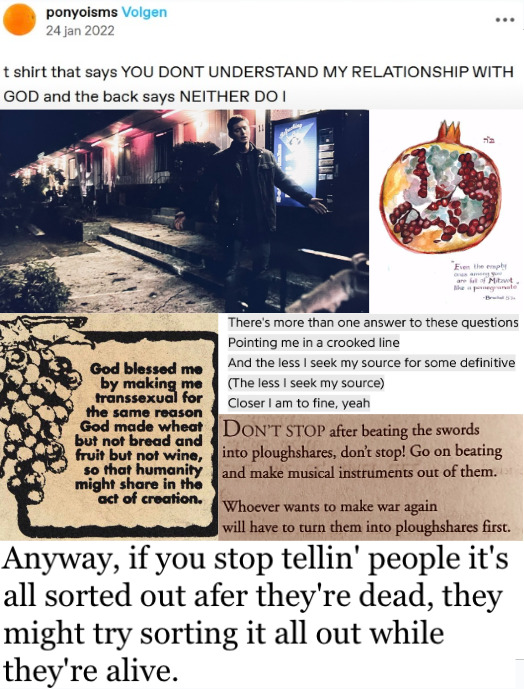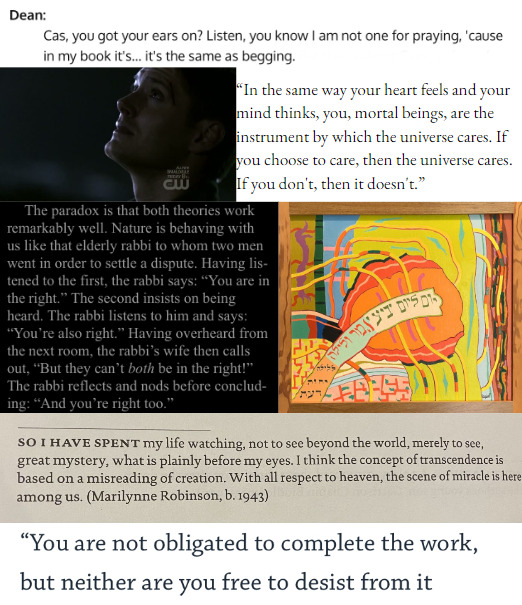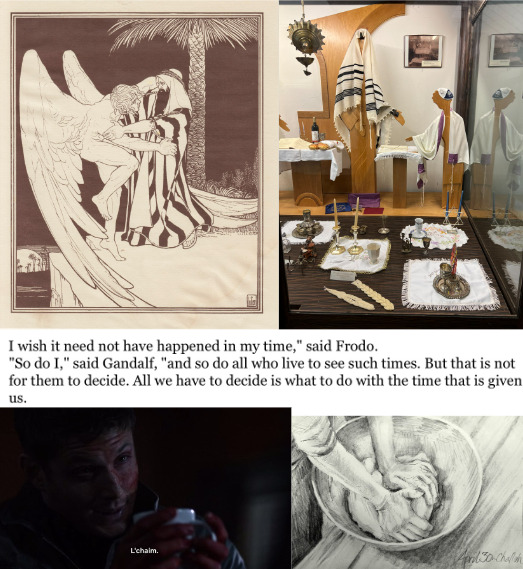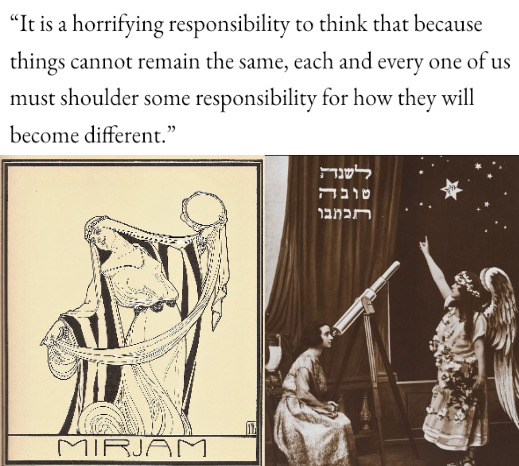#Mishkan
Explore tagged Tumblr posts
Text
28 notes
·
View notes
Text
#jumblr#faith message#torah#torah study#biblia#parasha ha shavua#moshe ravenu#moshe rabenu#mishkan#Rabbi Jacobsen
12 notes
·
View notes
Text
The Meeting Place with God
Let’s start in the beginning. Genesis 1:1 “In the beginning, when God created the heavens and the earth…” One the sixth day God created people, pronounced it better than good, declaring it was very good. On the seventh day, God rested. It was the first Sabbath, when man and woman could be in communion with God. In the beginning we were holy and able to be in the presence of God. From the…

View On WordPress
0 notes
Text

Chanukah candle blessings from Mishkan T’Filah.
43 notes
·
View notes
Text
"I have always believed that in order for LGBTQ Jews to connect with our God, we need to stop shaming LGBTQ Jews. God made us who we are, and we ought to fully acknowledge and celebrate every aspect of our lives. If we are committed to the theological ideal that all people are created b’tzelem Elohim, “in the image of God,” then we have to include gay, lesbian, bisexual, non-binary, and transgender people. God made us all. Just as we are. Full Stop. When we, as LGBTQ Jews, can stop separating our sexuality from our spirituality, we will live fuller, richer, and more meaningful lives. For me, this is an issue of shleimut—“wholeness” or “completeness.” The Jewish LGBTQ person lives in shleimut when she/he/zee does not have to be Jewish in one place and queer in another, but can be all of themselves at every place and every time. We cannot cut off our sexuality any more than we could cut off being Jewish, and if we have to hide any part of ourselves, we are not authentic to our own souls. Our integrity to live in the world is fully realized when we cannot only acknowledge our sexuality, but celebrate it as a gift from God. We are complete without needing to be changed. We are complete and whole and blessed."
-Rabbi Denise L. Eger in Mishkan Ga'avah: Where Pride Dwells
714 notes
·
View notes
Text
hate having to wait for my intro to judaism class to start next month before i start integrating more aspects of jewish life into my own bc i'm just so EXCITED to be an observant jew but i will practice Patience and Calm and Be Normal while i wait
#my finger is just itching hovering over the 'buy' button for a mishkan t'filah#looking at prayer shawls and kippot and going aihvfhgvgGVghhHg PLEASE 🙏#patience. patience. patience.#judaism#jumblr#jew by choice
27 notes
·
View notes
Text
I think I like Mishkan T'fila so much more than other siddurim because it's so big. Small siddurim are very difficult for my wacky hEDS fingers and wrists to handle.
#like i actually prefer the liturgy of the koren shalem siddur#but mishkan tfila is so much easier to flip pages and hold open than any other one ive had except maybe kol haneshamah weekday#jumblr
3 notes
·
View notes
Text
Parashat Tzav: El Korban Todah, El Sacrificio por Agradecimiento Rab Natan Menashe en YouTube
youtube
#jumblr#torah#torah study#biblia#parasha ha shavua#shalom#torah portion#shabbat shalom#youtube#rabbi#rav. natan menashe#machon meir tu casa en israel#judaismo#judaismo en vivo#korban#beit ha mikdash#mishkan#am israel jai
5 notes
·
View notes
Text

Permaid - Aeschleah DeMartino / Nicolette Mishkan
2K notes
·
View notes
Text
People's desire of.. their immense defensiveness of.. their right to comfort.. unfathomable to me. So many white americans right now will never, ever experience even an iota of the grief that palestinians... arabs... the global south have been feeling for the past.. month. Year. Century... now more than ever is so important to put antimperialism before your own feelings.
"Disturb us, Adonai, ruffle us from our complacency;
Make us dissatisfied. Dissatisfied with the peace of ignorance,
the quietude which arises from a shunning of the horror, the defeat, the bitterness and the poverty, physical and spiritual, of humans.
Shock us, Adonai, deny to use the false Shabbat which gives us the delusions of satisfaction amid a world of war and hatred;
Wake us, O God, and shake us from the sweet and sad poignancies rendered by half forgotten melodies and rubric prayers of yesteryears…
Make us know that the border of the sanctuary is not the border of living and the walls of Your temples are not shelters from the winds of truth, justice, and reality.
Disturb us, O God, and vex us; let not Your Shabbat be a day of torpor and slumber; let it be a time to be stirred and spurred to action."
Mishkan Tefilah 173
188 notes
·
View notes
Text
#I’m gonna wait to see what everyone else donates and then make up the difference#(and then be chastised by the text for my misplaced generosity)#(and then donate the precious stones since that’s the only thing still needed)
Yes, you get it.
I would donate the animal offerings because they're the only things left and I'd feel really bad about it lmao
67 notes
·
View notes
Text





@ponyoisms // Supernatural 4x18 - "The Monster at the End of This Book" // quote by Julian K. Jarboe // Pomegranate Jews, by Esther Rosen // "Closer to Fine" by the Indigo Girls // poem by Yehuda Amichai (taken from the "Mishkan T'filah for Travelers: A Reform Siddur") // "Good Omens: The Nice and Accurate Prophecies of Agnes Nutter, Witch" by Neil Gaiman and Terry Pratchet // "Cleopatra and Frankenstein" by Coco Mellors // "The Naval Treaty" by Sir Arthur Conan Doyle // photo of La Piccola Gerusalemme, taken by my parents // "JEWISH LESBIANS" Gay Freedom Day Parade, San Francisco, California c. 1978 // "The Two Towers" directed by Peter Jackson // YEHUDIT, by Pinchas EL Segal // Mi Chamochah (taken from the "Mishkan T'filah for Travelers: A Reform Siddur") // Supernatural 8x16 - "Remember the Titans" // Supernatural 5x14 - "My Bloody Valentine" // Fantasy High 1x17 - "Prompocalypse Pt. 2" // "Seven Brief Lessons on Physics" by Carlo Rovelli // "K.-4-1976," by Peter Krasnow // "The Death of Adam: Essays on Modern Thought" by Marilynne Robinson // Pirkei Avot, quote by Rabbi Tarfon // Jacob Wrestling With The Angel, by Ephraim Moses Lilien // photo of Judaica from La Piccola Gerusalemme, taken by my parents // "The Fellowship of the Ring" by J.R.R. Tolkein // Supernatural 6x15 - "Live Free or Twihard" // Kneading Dough, by Katherine Hartel // Neverafter 1x17 - "The Last Wish" // Mirjam, by Ephraim Moses Lilien // "Rosh Hashanah Postcards." Hidden Treasures: Celebrating Jewish Archives in Britain
#really just a mishmash of things that make me feel closer to G-d#idk if anyone else will relate#but this was important to me#webweave#webweaving#jewish#judaism#jumblr#jewish art#siddur#religion#spirituality#also like webweaves are my thing now#i’m making so so many#and i’m making it everyone’s problem
218 notes
·
View notes
Text
I mentioned this in the tags of an earlier post, but I wanted to explain a bit more about the alienated, shattered, exiled, othered imagery of the Divine in Judaism, and how that image of the Divine speaks deeply to me as a queer, non-binary Jew.
The Shechinah, the Divine Presence, is described in feminine terms and She goes with the Jewish people into galus, exile, at the destruction of the Temple in Jerusalem. What does it mean, for us to imagine G-d as being in exile with us? It's a profound image. We are exiled from our land, from the Beis HaMikdash and the closeness to the Divine Presence that it allowed, yes. But we are not totally cut off; the grief we feel is shared by Hashem Herself as we build a sacred remnant together in the diaspora. What does it mean, for the Divine Presence to be in exile with us, instead of whole? What do we learn from the idea that the sacred feminine is broken, exiled, and alienated along with the rest of klal Yisrael from the masculine Malchus? What does it say that the world will only be perfected (takken olam) when Hashem is One and Ha-Shem is One?
There is another image of the Divine that I've described here before, the holy darkness. The sacred dark that was before the beginning, that begins our days with ma'ariv, and that teaches us the lessons of infinity as the backdrop of the universe. To me it is a beautiful image, this idea that we are all sheltering under the wings of the Shechinah - that our darkness is the protective dark of an embrace. That we are held in a sukkat shalom - a shelter of peace. Like our sukkot, this does not mean we are safe or protected from the elements, but more that our home - our true home - is under the stars, and that no matter what, we are not alone. This article had a lot more fascinating things to say about this as well.
And finally, this image of a hidden G-d, a G-d that weeps for our suffering in G-d's hidden place (mistarim), who speaks silently, in the still small voice within our hearts. There's a drash that I'm still trying to track down about this because it was from several years ago, but it was about this hidden place of Hashem that G-d retreats to in order to grieve the sorrows of the world and how, if we truly want to be close to G-d, we will sit silently in that hidden place alongside Him.
These images and metaphors for G-d are not what is typically imagined. Most concepts of G-d are majestic in scope and elevated in stature. They are filled with the piercing bright light of clarity and gilded with the gold of the Mishkan, the First Temple, and the Second Temple. But we live in a humbler time. Hashem is Avinu Malkeinu - our compassionate, forgiving Father and the Ruler of the Universe, but what does that divine concept do for us when we live in a broken and unredeemed world? How can that traditional understanding of G-d speak to us when we are calling out to G-d from the depths? And especially for those of us who are seen as broken, dwelling in darkness, often hiding our true selves, and exiled from where we belong, how much more powerful is an understanding of G-d that goes into that exile with us and holds us in our grief and hard-won joy, as we endure together?
520 notes
·
View notes
Text
gender-affirming surgery as terumah for the completion of the mishkan (my body)
146 notes
·
View notes
Photo
Aeschleah DeMartino + Nicolette Mishkan

“A violet sunshine fills the house. I can hear birds chirping outside. The hour is ending.” -Permaid
594 notes
·
View notes
